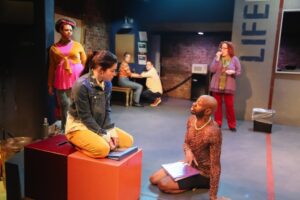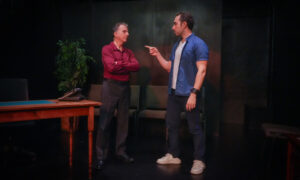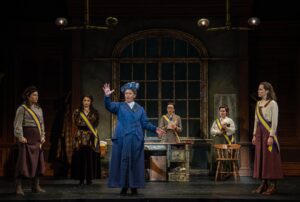Sadly, the short run is over for this well-conceived rendition of a very messy play written (with John Fletcher) at the end of Shakespeare’s life, and produced, originally, at London’s Globe Theatre — in fact, it was performed on the day the playhouse burned down.
With that ignoble beginning, Henry VIII has been resurrected only in the 20th Century. It presents a hodgepodge of events, from Henry’s divorce from Katherine of Aragon through machinations of Cardinal Wolsey, until his marriage to Anne Boleyn, and the birth of the subsequent Queen Elizabeth. But, conceived long after the Queen’s passing and the ascension of James I, the narrative tries to maneuver through the political ups and downs of Henry’s court and cannot please all, at all. In fact, in his introduction, director Will Block quotes the play, “’Tis ten to one this play cannot please all that are here.”
Obviously original audiences well understood most of the recent history unfolding before them and could discern, in particular, the religious turmoil described as Henry forsook his brother’s Catholic widow to embrace Protestantism in order to wed Nan Boleyn. But we know little of that now, and what stands out in the Porters’ production are two intriguing portraits: one of Henry VIII as performed by Jesse James Thomas, and Katherine of Aragon (essayed by Dawn Alden), even as she declares herself a victim of circumstances, yet nobly capitulates to her fate.
Although a simple production with less than a minimum of props, Block keeps the pageantry in motion with an extensive list of able performers surrounding Thomas Bigley as the villain Cardinal Wolsey (who gets his comeuppance), and including Anusha Shankar as the virtuous Anne Boleyn.
Video inserts, meant to break up the incessant march of English History, work well as television-style news updates, but bog down the end of the play as we learn (for anyone who wants to know) that Henry ended his days as a glutton. Still, this production deftly reveals the twists and turns of what may have been an unfinished play by Shakespeare, with its sympathetic portrait of a Catholic queen, followed by the justification for a Protestant court that one imagines came from Fletcher.
The Porters can be reached at: PortersOfHellsgate@gmail.com; or phone 818.325.2055.









